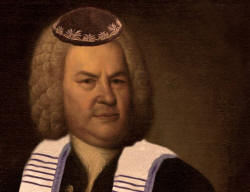 So
you've sung Bach's Mass in B Minor and it blew you away. Or you've always wanted
to sing that granddaddy of sacred music, but it wasn't in the cards for your
choir. Or you love singing sacred music, but you're Jewish and don't have many
opportunities to put your voice behind the liturgy you love.
So
you've sung Bach's Mass in B Minor and it blew you away. Or you've always wanted
to sing that granddaddy of sacred music, but it wasn't in the cards for your
choir. Or you love singing sacred music, but you're Jewish and don't have many
opportunities to put your voice behind the liturgy you love.
Well, The Dessoff Choirs has just the event for you. On Sunday, January 12, 2014, at 2 PM, the group presents a sing-in of a work that marries the transcendent music of the Mass in B Minor with Hebrew texts from the Jewish prayer book. It's called Bach's Prayer in B Minor, and it's the brainchild of Eric Weitzner, a New York psychiatrist who worships J.S. Bach's Mass in B Minor. The sing-in, at Congregation Habonim, 44 West 66th Street in Manhattan, is the first time the old/new piece will be heard anywhere.
"About eight years ago," says Dr. Weitzner, "I began thinking that although Judaism had a rich tradition of cantorial music, as well as folk and popular music, there was nothing in our tradition of sacred music that could compare in grandeur or beauty to the Mass in B Minor of Bach. Although I'm not a composer, I decided that my love for this masterpiece, and for the Hebrew language, would make it possible for me to create a Hebrew text in the language of the traditional Jewish prayer book that could replace the Latin text in Bach's Mass."
Each movement of Bach's Prayer in B Minor expresses an idea that is
related to the corresponding Christian one in the Mass and fits the emotional
tone of the music.
For example, the Kyrie of the Mass is transformed into an invocation to God to
"draw near"; the Gloria remains a hymn of praise but acquires a Jewish accent;
the Latin Credo is replaced by an adaptation of Maimonides' thirteen principles
of faith. The final word of the Mass—pacem, or peace—is reflected in the Hebrew
word shalom, which concludes the Amidah prayer.
At the sing-in on January 12, selected movements of Bach's Prayer in B Minor will be prepared in advance and presented by members of Dessoff, while other parts of the work will be sung by everyone in attendance. You can also bring your friends and family because there's no obligation to sing. Everyone is invited to experience the great affinity between the Christian and Jewish faiths, and the universality of Bach's sublime music.
If there's anyone who knows the Mass in B Minor better than Dr. Weitzner, it's Dessoff's music director Christopher Shepard, who will lead the sing-in. A few months ago, Chris received the coveted Julius Herford Prize from the American Choral Directors Association for his Ph.D. dissertation: Evolution and Revolution: J.S. Bach's Mass in B Minor, BWV 232 in New York City, 1900-1980. In March 2012, Chris conducted the work with Dessoff, and a few months later, the choir sang it in Mexico City with conductor Carlos Miguel Prieto and National Symphony Orchestra of Mexico.
Chris says that when Eric Weitzner approached him with his adaptation of the Mass in B Minor to principles of Jewish theology, he leapt at the prospect. "We get to see Bach's masterpiece through an entirely different lens. This new imagining of Bach's Mass setting is one of the most creative – and least expected – approaches to Bach's music I have ever seen." During the sing-in, both Dr. Weitzner and Chris Shepard will offer spoken commentary.
The sing-in is the opening event in Dessoff's 2014 "Midwinter Festival, Second Life," which is devoted to familiar musical works that reappear in unexpected arrangements. Two concerts round out the Festival: "Choral Juxtaposition" on February 8, and "Brahms the Revisionist" on March 9. Tickets for the sing-in are $15 ($10 seniors/students), and are available at www.dessoff.org or by calling 212-831-8224. Scores will be provided.
Miriam Lewin has been a soprano with The Dessoff Choirs for 20 years. When she's not singing, she is a television and radio producer.
